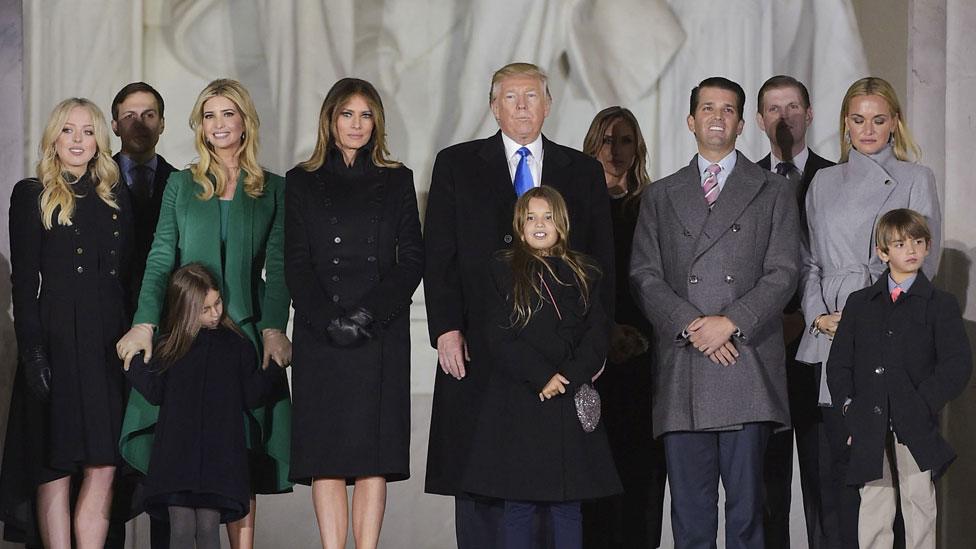Is this a smoking gun and other Trump Jr questions
- Published
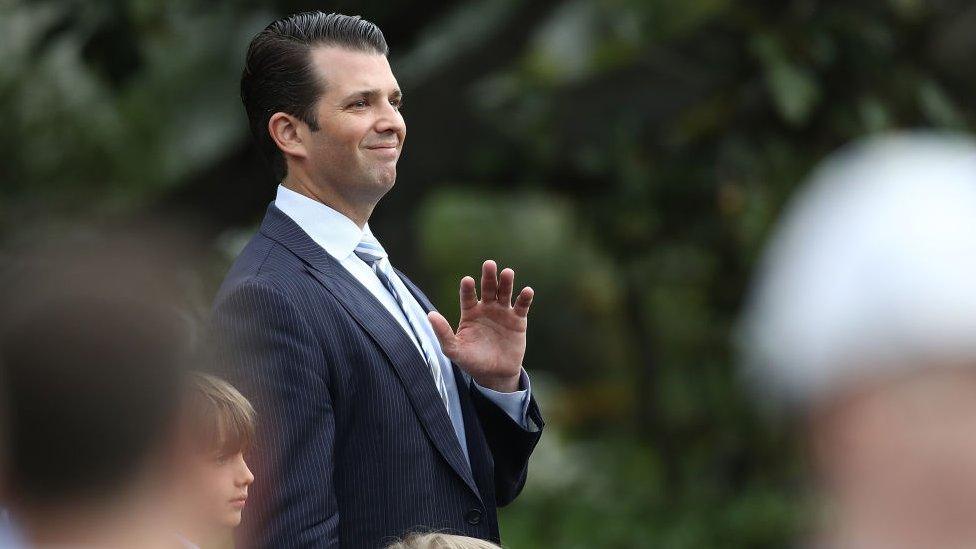
Call it a journalistic triple punch.
The New York Times on Friday revealed, external that Donald Trump Jr, his brother-in-law Jared Kushner and then-campaign chair Paul Manafort had a previously undisclosed meeting with an influential Russian lawyer in Trump Tower during the heat of the 2016 presidential campaign.
Then, on Sunday, the paper reported, external that during the meeting the group discussed information that was possibly damaging to Hillary Clinton and the Democrats. Trump Jr had previously said only that the meetings were "primarily" about a suspended Russian adoption programme.
Finally, the Times on Monday evening landed the haymaker - that Trump Jr went into the meeting thinking it was the Russian government itself that had incriminating information on the Democratic candidate.
Those stories, and subsequent reporting, external by the Washington Post, raise a bevy of questions. Here are a few of the big ones.

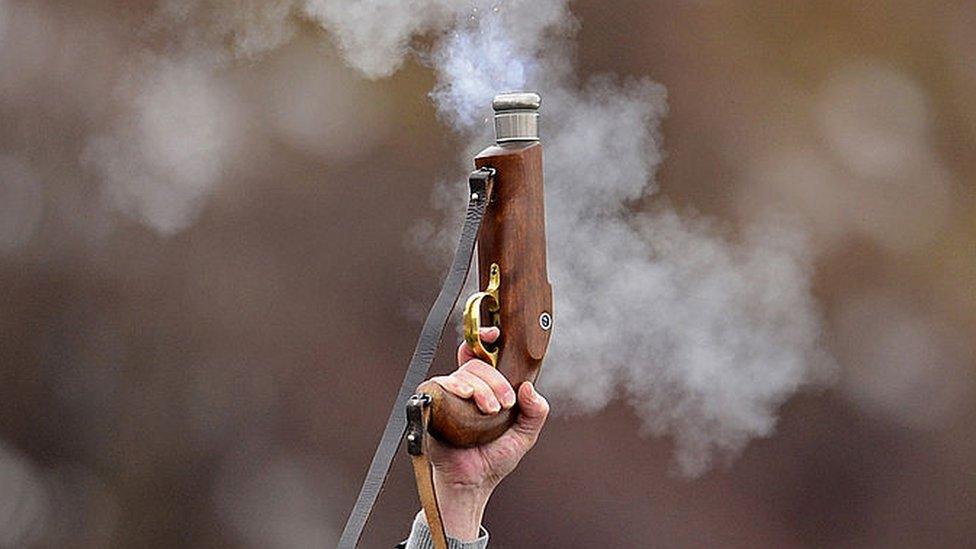
Is this a smoking gun?
What is a gun? What is smoke? Is anything real any more? The media could discover a metaphorical .357 Magnum on the floor, still warm to the touch, and it would probably be dismissed by many as just another bit of fake news.
These latest revelations aren't going to cause such existential angst, but they're still enlightening - and could be bad news for Trump Jr. For the first time there's confirmation of a meeting between Mr Trump's inner circle and someone with ties to the Russian government where campaign issues were discussed.
More than that, Trump Jr seems to have walked into the meeting with the impression that the Russian government wanted to help his father - and there's email evidence that supports this.
As the Washington Post puts it, external: "The meeting suggests that some Trump aides were in the market to collect negative information that could be used against Clinton - at the same time that US government officials have concluded Russians were collecting such data."
That may not be evidence of collusion, but it gets close to evidence of a willingness to collude.
News of the hack of the Democratic National Committee (DNC) servers first surfaced a week later. Roughly a month after that, Wikileaks began releasing information from the hack, causing a political headache for the Democrats just before their national convention.
Now throw in the fact that both Mr Kushner and Mr Manafort have been mired in their own Russia-related controversies, and the plot thickens.

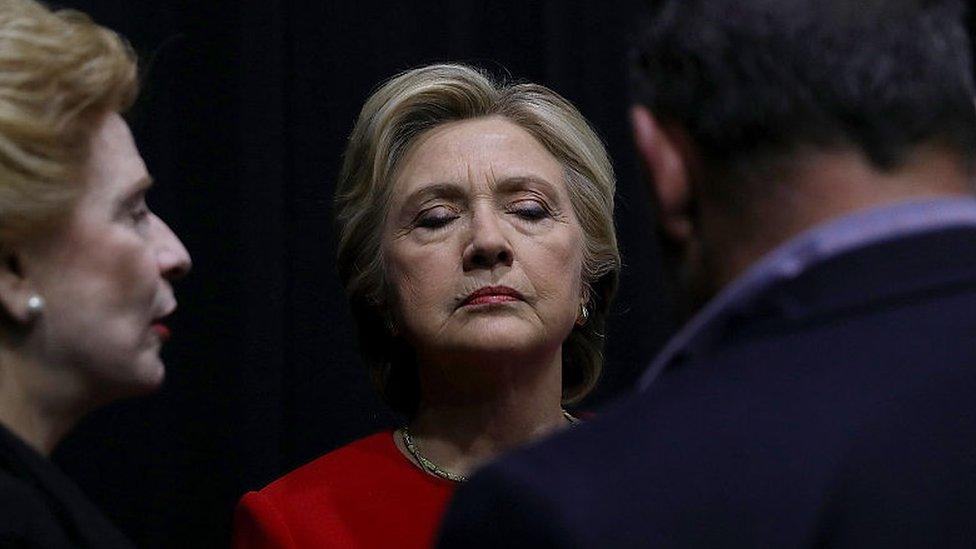
Hillary Clinton had her own campaign operatives investigating Donald Trump
Doesn't every campaign look for dirt on opponents?
"Everybody does it" is Trump Jr's current defence of the meeting, after his original explanation was undercut by subsequent revelations and his revised statement proved more incriminating than exculpatory.
"Obviously I'm the first person on a campaign to ever take a meeting to hear info about an opponent," he tweeted sarcastically. "Went nowhere but had to listen."
"Opposition research", as it's called, is a standard part of any campaign. Usually a candidate has a team of researchers chasing down any and every possible bit of unflattering information on their opponents.
Dirt-digging is a messy business, however, and these units usually have a fair amount of separation from a candidate's top team to insulate the campaign from embarrassing blowback. Such insulation was non-existent in this case.
A Russian national, apparently at the behest of a British publicist working for a Russian music star who is the son of a billionaire real estate developer, was able to arrange a sit-down meeting with three top figures in the Trump campaign.
As Republican campaign strategist Evan Siegried points out, external, even for a campaign as unconventional as Mr Trump's, letting those close to a candidate talk to sources of uncertain background is "not just dumb", it's a serious departure from basic standard operating procedure.
Another Republican operative, Stuart Stevens, drew comparisons to an episode during the 2000 presidential race between Al Gore and George W Bush.
"When Gore campaign was sent Bush debate brief book, they called FBI," he tweeted, external. "If foreign interests offer you info on former [secretary of state], you call the FBI."
The Trump team didn't do that. Instead, they took the meeting.

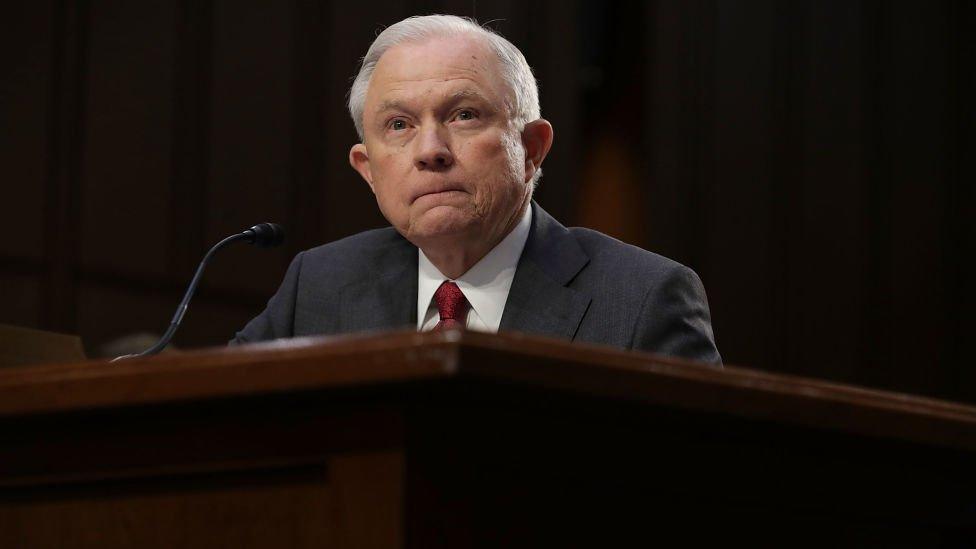
Attorney General Jeff Sessions is one of several Trump aides caught up in Russia-related trouble
Why are Russia questions so hard for the Trump team?
In June, Trump Jr took to Twitter to celebrate former FBI head James Comey's testimony that there was no evidence campaign aides had "repeated contacts" with Russians. Now, it turns out, he helped set up one such meeting - and reportedly thought that the Russian government was a willing partner.
Mr Kushner wrote in his security clearance application that he never met with Russian nationals - and had to subsequently revise his answers when it was revealed he had multiple meetings.
Close campaign aide turned White House National Security Advisor Michael Flynn said he never spoke with Russian Ambassador Sergei Kislyak about sanctions. He resigned in disgrace after government surveillance proved that assertion inaccurate.
Mr Manafort had to acknowledge he received millions in payments from a pro-Russian Ukrainian party and retroactively register as a foreign agent, after insisting last year that he had no such ties.
Jeff Sessions, a close political confidant of Mr Trump during the campaign and now US attorney general, had to recuse himself from his department's Russia investigation because he was not forthcoming about his own meetings with Mr Kislyak.
Time and time again, those close to Mr Trump have had to backtrack on assurances they made that they did not have Russian contacts or connections. Taken individually, these episodes may be unremarkable. In their totality, however, they become a steady drumbeat of evasion and obfuscation whenever the topic of Russia comes up.

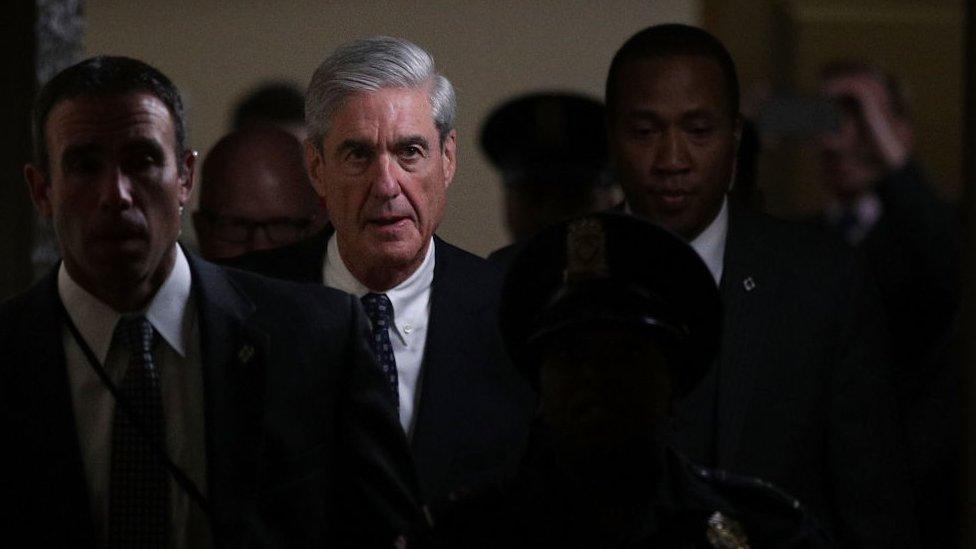
Independent Counsel Robert Mueller may have some questions for Trump Jr
What effect will this have on the Russia investigations?
Several congressional committees and Independent Counsel Robert Mueller are looking into possible collusion between the Trump campaign and Russia. The Trump Tower meeting, while it may not be a smoking gun, will definitely pique their interest - and could result in legal exposure for Trump Jr.
On Monday morning Republican Senator Susan Collins of Maine said that the Senate Intelligence Committee should interview Trump Jr and other participants about what took place in New York last June. Adam Schiff of California, ranking Democratic member of the House Intelligence Committee, has made a similar call.
Trump Jr's assertion that neither Mr Manafort nor Mr Kushner knew the details of the meeting ahead of time appears to insulate those two from possible political and legal fallout, as does Mr Trump's lawyer's statement that the president was not aware of the meeting. Trump Jr may not be so fortunate.
"His statements put him potentially in legal crosshairs for violating federal criminal statutes prohibiting solicitation or acceptance of anything of value from a foreign national, as well as a conspiracy to defraud the United States," writes, external Darren Samuelsohn in Politico.
For the past few weeks, some Trump supporters have been insisting that even if members of the campaign did co-ordinate with Russian operatives, it wouldn't have been illegal or even improper.
At the time the assertions appeared unexpected and unnecessary. That's not so much the case anymore.

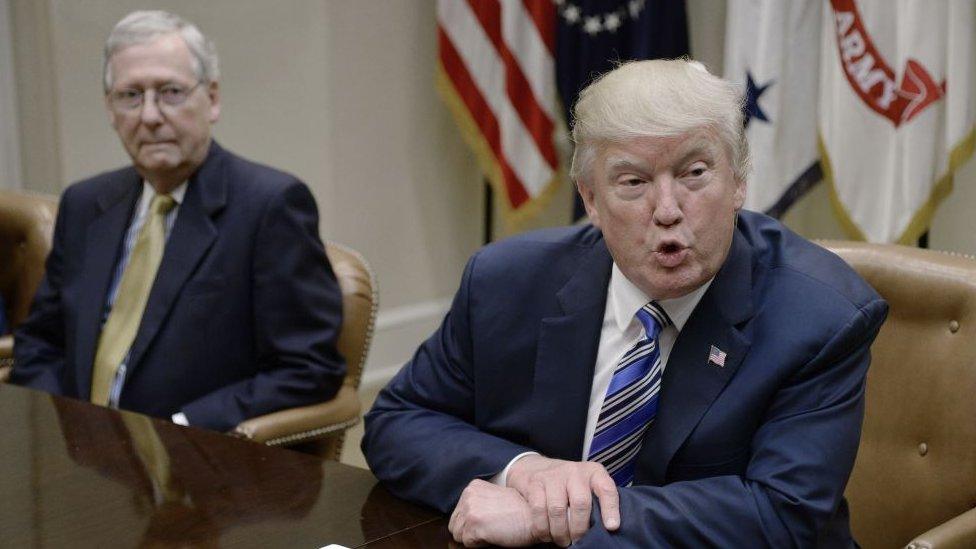
Donald Trump and Senate Majority Leader Mitch McConnell have a lot on their plate
What does this mean for Trump's political agenda?
There are two schools of thought surrounding the impact this could have on Mr Trump's efforts to enact healthcare and tax reform, devise a federal budget, pass some sort of infrastructure spending bill and do all the other stuff that used to occupy the days of a pre-"modern" presidency.
On one hand, the latest round of Russia stories are crowding out any efforts to promote the president's priorities on the public stage. The latest iteration of the Senate's Obamacare repeal bill is woefully unpopular, and there's been little opportunity for any of its advocates - whether in the administration or Congress - to make a high-profile pitch for why it should be made law.
Other agenda items, like tax reform, are so far back on the burner they may have fallen completely off the stove.
The counter to this is that, given the heat many politicians have taken over proposed elements of the healthcare bill, flying under the public's radar may afford the involved parties time and space to regroup.
Two weeks ago, members of the Senate were being hounded by reporters for the latest details on the ongoing healthcare fight. This week, the media's lidless gaze is fixed elsewhere. Senate Majority Leader Mitch McConnell has already sent two draft bills to the Congressional Budget Office for analysis. If he gets a result that's positive for his party, he may try to race to a vote before opposition mounts.
Of course these theories may well co-exist.
Congressional Republicans could have the space to quickly pass a new healthcare bill and get it on Mr Trump's desk for a short-term win. Without the ability to boost its approval ratings, however, the unpopular law ends up being a long-term drag on the party heading into next year's midterm election and undermines subsequent legislative efforts.
With a little help from his eldest son, Mr Trump could end up losing by winning - or vice-versa.
Follow Anthony Zurcher, external on Twitter.
- Published10 July 2017
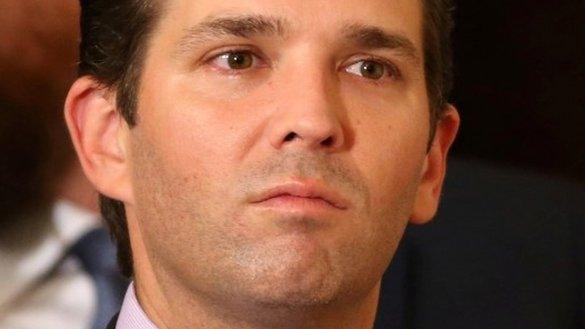
- Published14 September 2018
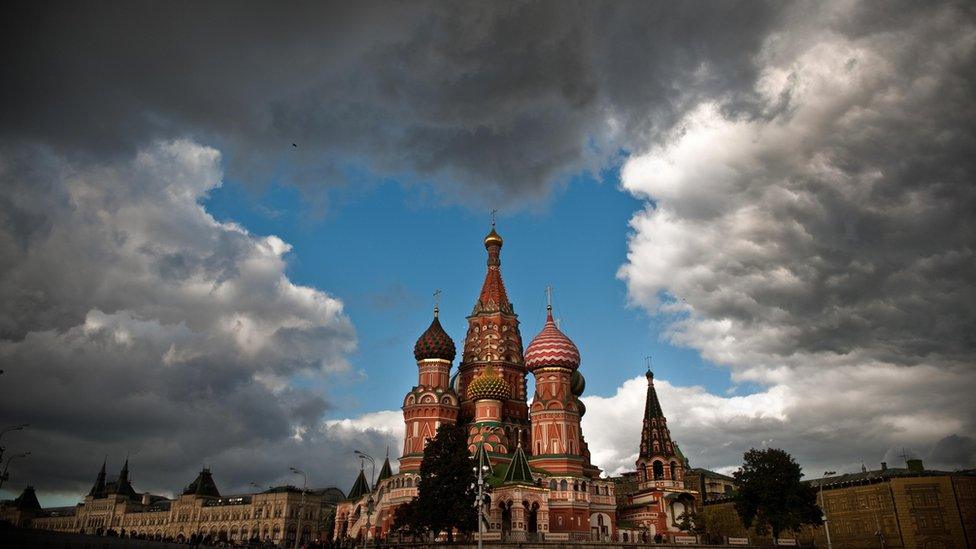
- Published30 March 2017
